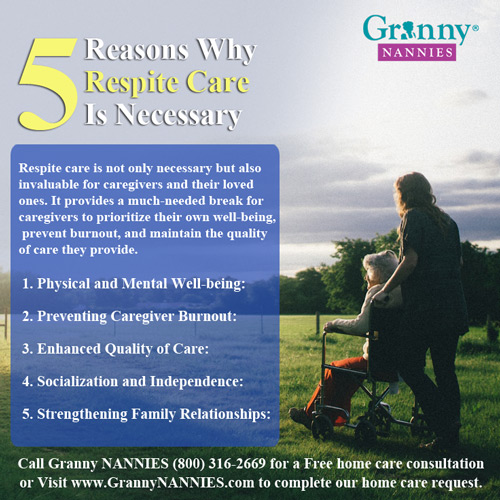 Caring for a loved one can be both rewarding and challenging, especially when you’re responsible for their well-being on a daily basis. The demands of caregiving can often lead to exhaustion and burnout, which is why respite care plays a crucial role in providing much-needed relief. In this blog post, we will explore five reasons why respite care is necessary for caregivers and how it benefits both caregivers and their loved ones.
Caring for a loved one can be both rewarding and challenging, especially when you’re responsible for their well-being on a daily basis. The demands of caregiving can often lead to exhaustion and burnout, which is why respite care plays a crucial role in providing much-needed relief. In this blog post, we will explore five reasons why respite care is necessary for caregivers and how it benefits both caregivers and their loved ones.
- Physical and Mental Well-being:
Caregiving can take a toll on a person’s physical and mental health. Constantly attending to the needs of another person without taking time to care for oneself can lead to exhaustion, stress, and even depression. Respite care offers caregivers an opportunity to take a break, recharge, and focus on their own well-being. Whether it’s a few hours, days, or even weeks, respite care allows caregivers to rest, engage in self-care activities, and maintain their overall health.
- Preventing Caregiver Burnout:
Caregiver burnout is a real and significant issue. When caregivers are overworked and overwhelmed, their ability to provide quality care decreases, leading to potential negative consequences for both the caregiver and the person receiving care. Respite care acts as a preventive measure, providing caregivers with the much-needed time off to relax, rejuvenate, and maintain a healthy work-life balance. By preventing burnout, respite care ensures that caregivers can continue to provide the best possible care for their loved ones.
- Enhanced Quality of Care:
When caregivers are exhausted or stressed, it can impact their ability to provide optimal care. Respite care allows caregivers to recharge and return to their caregiving role with renewed energy and focus. This break from caregiving responsibilities can help improve their patience, empathy, and overall caregiving skills. Additionally, respite care providers are trained professionals who can offer specialized care and support tailored to the unique needs of the individual, resulting in an enhanced quality of care.
- Socialization and Independence:
For individuals receiving care, respite care can provide an opportunity to engage in social activities and interact with others. Social isolation is a common concern for both caregivers and care recipients. Respite care programs often offer group activities, outings, and opportunities for socialization, fostering a sense of community and promoting emotional well-being. Moreover, respite care can encourage the independence of the care recipient by exposing them to new experiences and enabling them to develop relationships outside their usual caregiving environment.
- Strengthening Family Relationships:
Caregiving can sometimes strain family relationships, as the demands and responsibilities can become overwhelming. Respite care can help alleviate this strain by providing family members with time to reconnect and nurture their relationships. By sharing the caregiving responsibilities, family members can work together more effectively, ensuring that the burden doesn’t fall solely on one person. This shared experience of respite care can strengthen family bonds and promote a supportive and collaborative environment.
Respite care is not only necessary but also invaluable for caregivers and their loved ones. It provides a much-needed break for caregivers to prioritize their own well-being, prevent burnout, and maintain the quality of care they provide. Furthermore, respite care offers care recipients an opportunity to socialize, engage in activities, and foster their independence. By recognizing the importance of respite care, we can support and empower caregivers while ensuring the overall well-being of both the caregiver and the care recipient.
For more information on how we can help you, Contact our Jacksonville office at 904-731-2100 or visit our website at https://grannynannies.com/Jacksonville or Contact our Gainesville office at 352-327-3877 or https://grannynannies.com/Gainesville